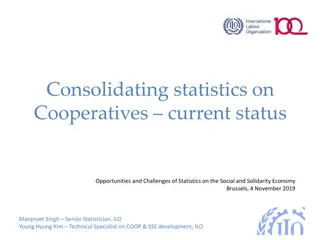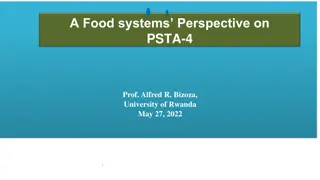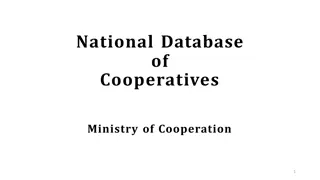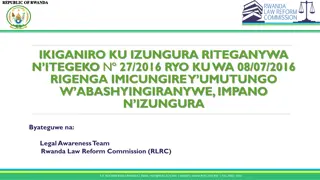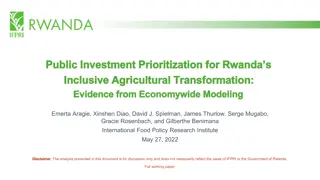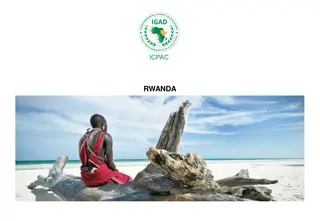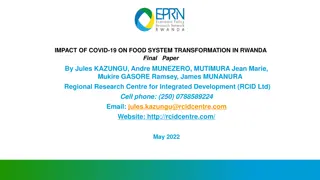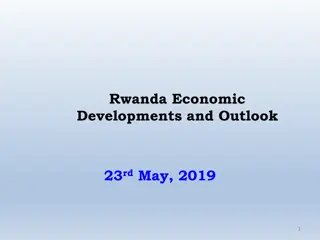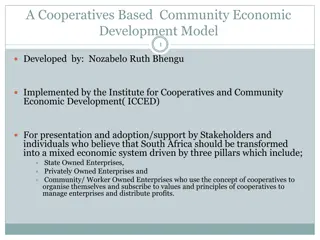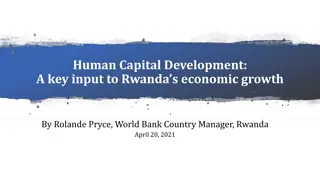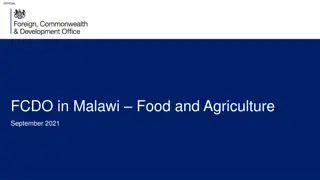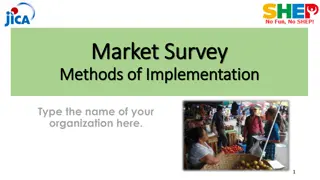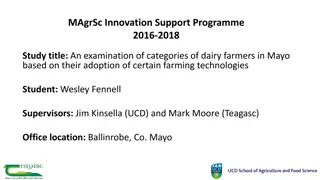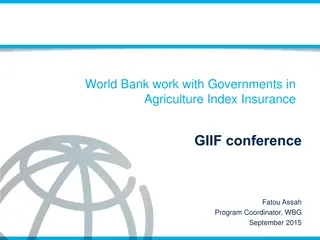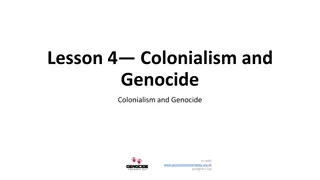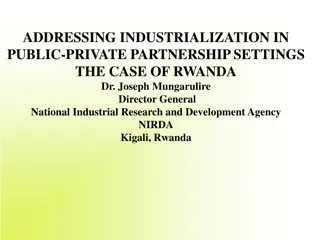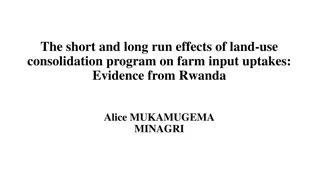Impacts of COVID-19 on Agriculture and Food Systems in Rwanda: Evidence from Farmers' Cooperatives
This study assesses the effects of the COVID-19 pandemic on agriculture and food systems in Rwanda, specifically in Huye and Nyamagabe districts. Funded by EPRN, the research aims to understand the implications of the pandemic, review government responses, and propose policy options to enhance sector resilience post-COVID-19. Methodology involved both primary and secondary data sources, revealing challenges faced by farmers' cooperatives, such as crop quantity decline, reduced demand, and losses in perishable crops.
Download Presentation

Please find below an Image/Link to download the presentation.
The content on the website is provided AS IS for your information and personal use only. It may not be sold, licensed, or shared on other websites without obtaining consent from the author. Download presentation by click this link. If you encounter any issues during the download, it is possible that the publisher has removed the file from their server.
E N D
Presentation Transcript
IMPACTS OF COVID-19 ON AGRICULTURE AND FOOD SYSTEMS IN RWANDA Evidence from farmers cooperatives in Huye and Nyamagabe districts By Dr. Robert S. Ntuite
Outline Justification and Objective of the study Research Methodology Findings of the study Conclusion, policy recommendations 2 Ministry of Trade and Industry 2013 Economic Policy Research Network
Justification & Objective of the study This study was undertaken for assessing the impact of COVID-19 on agriculture and food systems in Rwanda and was funded by EPRN in collaboration with its partners for the 8th Annual Research Conference. The purpose of the paper is to better understand the implications of COVID-19 pandemic for anticipating that with well-designed interventions and support, the agriculture sector and food systems will re-bounce normally. The objectives of the study are threefold: to assess the impacts of the COVID-19 outbreaks on agriculture and food systems in Rwanda; to review the policy responses took by the government of Rwanda to mitigate the effects of COVID-19 crisis; to provide contextual policy options that the government and its partners should adopt to build the resilience of the agricultural sector and improve food systems during post-COVID-19 recovery against future unexpected shocks. 3 Ministry of Trade and Industry 2013 Economic Policy Research Network
RESEARCH METHODOLOGY The methodological approach used by the study is mixture of primary and secondary sources of data. The Primary data was collected by using mainly Phone calls and some data was collected through Face-to-Face interviews with key informants, in Huye and Nyamagabe districts between December 2021 up to February 2022. The total population concerned by the study was 191 registered farmers cooperatives, but due to the time and financial cost, the researcher selected randomly 58 farmers cooperatives out of 191 cooperatives from two districts. The farmers cooperatives selected for survey were based upon some criteria of crops with the highest importance & for job creation including these 6 plants: maize, beans, cassava, wheat, Irish potatoes, and horticulture. 4 Ministry of Trade and Industry 2013 Economic Policy Research Network
FINDINGS OF THE STUDY The findings of the paper revealed that farmers cooperatives surveyed have experienced different kind of difficulties amid COVID-19 including: A significant decline in agricultural crops in terms of quantities harvested didn t appear amid COVID-19 as confirmed by (70.68%) of respondents. A decrease in demand for crops was observed caused by reductions in income among the consumers and lower sales price of crops caused by difficulties in transport of harvested crops from point A to Point B (place of market). A huge loss from perishable crops during COVID-19 crisis was revealed due to lack of national storage system of these crops and national crops reserves. 5 Economic Policy Research Network
Cont findings A lack a strategic food reserve system was observed as the government departments and NGOs partners even before COVID-19 pandemic lacked relevant data regarding how much food is produced within the country at a given period of time; Lockdown negatively affected the availability and prices of inputs, planting materials and labor used in agriculture There was a disruption of transporting activities due to the immobility of farmers. A high food losses and wastage had been observed amid COVID-19, including loss of perishable crops which had discouraged farmers and therefore reduced production levels, income of farmers; 6 Ministry of Trade and Industry 2013 Economic Policy Research Network
Cont findings the study revealed a lack of storage facilities in terms of appropriate equipment for the storage of vegetables, fruits, and dairy products. Indeed, traders and exporters of these perishable items were unable to manage the losses due to lack of transports, labor, and decreasing demand domestically and internationally. Finally (81.0%) of surveyed farmers argued having sold their assets, used savings or requested loans to cope with the COVID-19 crisis. This situation implies a possible delay in future production operations may even push the most vulnerable farmers' cooperatives into poverty and creating widening gap between rural and urban areas. 7 Ministry of Trade and Industry 2013 Economic Policy Research Network
CONCLUSION The agriculture sector and food systems in Rwanda play a crucial role in job creation and employment as the sector employs more than 70.0% of people directly or indirectly. This sector is essential to the transformation of the national economy from developing country to emerging economy; but the findings revealed that The majority of surveyed farmers cooperatives had lost incomes and agricultural crops due to the pandemic. Finally, COVID-19 crisis should be seen as good opportunity and motivation to rebuild the country s agri-food systems including food processing system based on the gaps and weaknesses revealed by the study. 8 Ministry of Trade and Industry 2013 Economic Policy Research Network
POLICY RECOMMENDATIONS FOR RECOVERY Based on the study findings the following policy options are recommended to stimulate recovery: The increase of the farmers cooperatives liquidity should be maintained in order to improve their productive capacity and operations; The implementation of a national food reserve or digital food reserve dashboard is needed. This could be helpful to ensure a coordinated national response in times of food crisis and get food where it is needed more quickly. the food collection centers should be implemented instead of allowing the farmers delivering their produce to the markets themselves amid COVID-19 pandemic; There is a need to implement food processing units or plants that could help farmers converting all the perishable crops into finished products for the markets; this solution will finally avoid any loss of crops in future crisis; In order to increase the accessibility to finance among farmers 'cooperatives, there is a need to implement a well-organized farmers SACCO; this will help farmers having access to secured or unsecured loans easily instead of granting them funds that they will be using for a week or a month. 9 Ministry of Trade and Industry 2013 Economic Policy Research Network
Thank You EPRN Tel: 0788357648 info@eprnrwanda.org www.eprnrwanda.org


